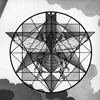 This double album by the prolific Reto Mäder (Ural Umbo, Sum of R) has a surprisingly personal feel to it, given its dark and murky pedigree. Even during the moments where he works heavily with dissonance and abstract, disembodied noise, it is all tied together with a natural beauty that belies its seemingly dark nature.
This double album by the prolific Reto Mäder (Ural Umbo, Sum of R) has a surprisingly personal feel to it, given its dark and murky pedigree. Even during the moments where he works heavily with dissonance and abstract, disembodied noise, it is all tied together with a natural beauty that belies its seemingly dark nature.
Although spread over two discs, sonically there does not seem to be any significant divide between the material on each, Two Angles sounds more like two distinct parts of a singular whole.Processed and natural sounds exist together, like on "Betwixt," where a frozen guitar squall and acoustic strings are contrasted with a soaring white noise roar.
One of the significant strengths of this album is how well Mäder works in building and structuring his compositions:brittle digital noise and repetitive piano patterns open "Orka's Dream" and evolve from a gentle mid-section, offset by menacing, deep thuds in the distance.Tension builds with the jarring, dissonant strings but everything eventually relents, ending the track on a calming note. "Because of the Slow Shutter Speed" pairs some up front dissonant electronic buzzing with tubular bells, balancing the natural sounds with the dark, unidentifiable ones, all of which is eventually destroyed by an electric guitar outburst.
"Show Me the Shadow of the Sun" makes for one of the exceptions to this careful sense of structure, however.Ringing bells, harmonium like expanses and weird rhythmic outbursts result in a piece that comes across as less song-like and more collage-based, and while it works for what it is, it does not have the same impact as the more deliberate, composed moments.
The best moments are the warmest and the most beautiful. Tense repetitive guitar and piano stabs of "May 30, 2012" transitions well into the gentle synth layers of "Bees and Ghosts." Here, gentle synth layers slither about before reaching a bombastic musical climax. Mäder leads off "Samsa" with overdriven guitar and a lo-fi crust covering everything, but soon reforms the song as a wonderful piece of abstract chamber music.It has a personal, intimate feeling, even though the source of the sounds is extremely hard to pin down.
Mäder's work usually focuses on more sinister sounds and moods, but here it is not as prominent.Instead, he works more with rich, beautiful melodies and gentle tones instead of just raw noises and ugly sounds.The result is a complex, diverse work that stands out as distinctly singular even amongst his multitude of diverse side projects.
 
Read More

